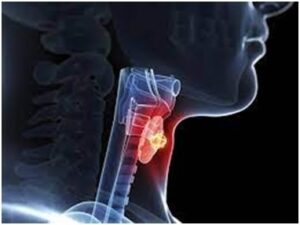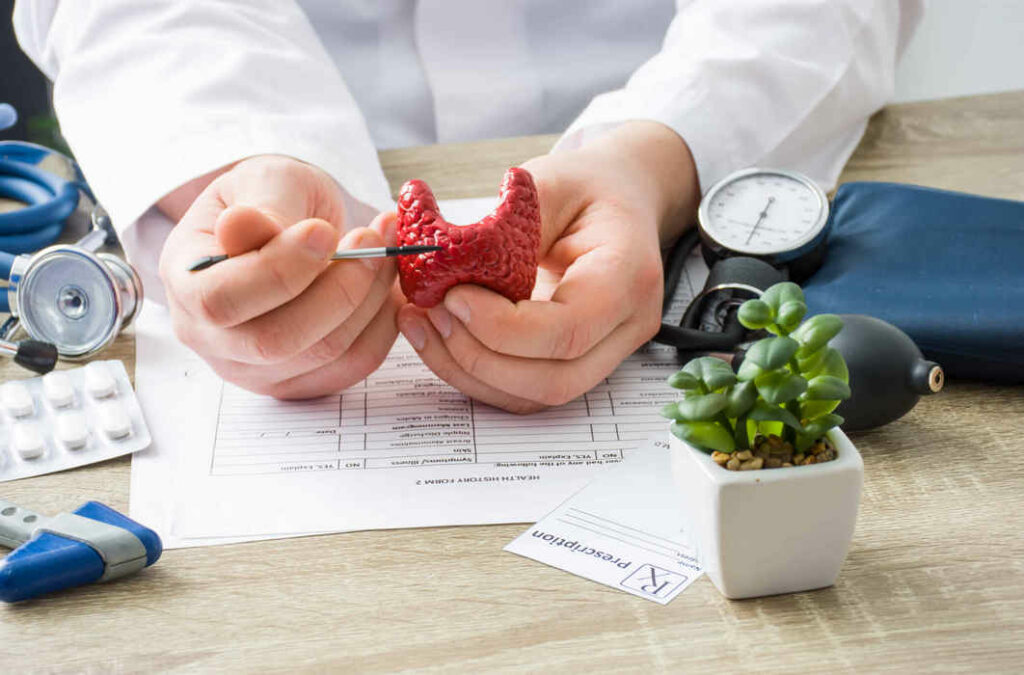Dec 09, 2023 by EMPWellness Admin
Thyroid disease is one of the inherited and acquired diseases, which all people and in any age group may be exposed to this disease. Among the types of this disease are hypothyroidism and hyperthyroidism.
The thyroid gland is located in front of the neck and around the trachea, the shape of this gland is similar to a butterfly with its body in the middle and its wings spread around. Thyroid is one of the important glands of the body that is responsible for controlling metabolism. In the process of metabolism, the food entered into the body is converted into energy.
The energy obtained from metabolism is necessary for the proper functioning of the body so that it supplies energy to all the body systems so that the body organs can perform their tasks properly. Metabolism is controlled through the thyroid using the thyroxine hormone, which contains 4 iodine atoms, and the triiodothyronine hormone, which contains 3 iodine atoms.
These two hormones are produced by the thyroid gland and regulate the amount of energy received by body cells. If the thyroid is functioning properly and the hormones are in balance, your body’s metabolism will work properly.
The control of thyroid function in the bloodstream is done by the pituitary gland located in the center of the skull, which is located under the brain. If the amount of this hormone goes higher or lower than the required level, the pituitary gland adjusts its amount. At this time, the thyroid regulating hormone, called TSH, is sent to the thyroid and sends messages to adjust the amount needed to restore the body’s balance and normal state.
hyperthyroidism
When the production of thyroid-by-thyroid hormone is more than what the body needs, hyperthyroidism occurs in the body. Due to the production of a large amount of this hormone, the body is forced to quickly consume the energy resulting from metabolism, in which case the person feels very tired. In this case, increased heart rate, weight loss and nerve weakness are among the dominant symptoms.
Hypothyroidism
Thyroid hormone production less than the body needs by thyroid hormone causes hypothyroidism. People with hypothyroidism feel tired all the time, have low tolerance for cold temperatures and gain weight.
Thyroid hypofunction and hyperfunction disorders may occur due to various factors in people, one of which is the hereditary nature of this disease.
Thyroid test
All healthy people should have regular tests to check their thyroid levels to ensure the health and function of this gland. People who have diabetes, especially type 1 diabetes, because they are more at risk of this disease, should have a thyroid test every year after being diagnosed with diabetes. But people with type 2 diabetes should do the test if recommended by the doctor.

Symptoms of hyperthyroidism
People who are suffering from hyperthyroidism, symptoms including: nervousness, stress and anxiety, irritability, insomnia, weight loss, weakness and trembling of body parts, goitre or enlarged thyroid gland, feeling very hot, irregular menstruation or cessation of menstruation. In women, they also experience eye irritation or vision problems.
Symptoms of hypothyroidism
Hypothyroidism also has certain symptoms, including these symptoms: weight gain, feeling tired, forgetfulness, frequent and heavy menstruation in women with hypothyroidism, loud and hoarse voice, growing thick and thick hair, and feeling cold. It is at body temperature.
Ways to prevent hypothyroidism and hyperthyroidism
Due to the fact that hypothyroidism and hyperthyroidism can be hereditary in addition to the individual’s own behavior, but it is a preventable disease that can be easily controlled. The use of nutrients, including foods containing zinc and selenium, is very important in controlling the activity of this gland. In addition, following a proper diet helps to balance the thyroid level in the body.
People who suffer from hyperthyroidism or hypothyroidism should see a specialist doctor as soon as possible so that the treatment process can begin and by taking the drugs prescribed by the doctor, they can quickly balance the secretion of this hormone.
Fortunately, eating the right nutrients and taking medications may help reduce symptoms and improve thyroid function. Useful nutrients for this gland are iodine, selenium and zinc. Following a proper diet can minimize your symptoms and help you maintain a healthy weight.
Foods that help improve thyroid function:
Among the foods that can help us balance the activity of the thyroid gland is the use of seaweed, which is rich in the micronutrient iodine, and is very useful to compensate for its deficiency.
Nuts are also among the food items that are very important for balancing the secretion of the thyroid gland with the micronutrient selenium. Among these nuts are: hazelnuts, Brazil nuts, etc.
Among other useful foods to regulate the production balance of this hormone are frozen yogurt, fresh eggs and cooked fish.
In addition to the above, in order to maintain the health and balance of the thyroid gland, it is necessary to use enough iodine, and it is also very important to provide the necessary amount of vitamins A and D and the micronutrients zinc and selenium.
Thyroid diagnosis
If you feel that you have symptoms of hypothyroidism or hyperthyroidism, be sure to visit a doctor for an examination and describe your condition. One of the most definitive ways to diagnose this disease is a blood test, in which the amount of thyroid hormones in the blood is measured and the type of your disease is determined. In this test, blood is taken through a vein.
A specialist doctor may use several tests to diagnose thyroid, which include: TSH, T4 and T3 tests, these tests accurately show the function of your thyroid gland. If in the results of the tests, the TSH level is high and the T4 level is below the balance, the person has hypothyroidism.
At what age is thyroid disease common?
Thyroid disease is an inherited and acquired disease that can occur at any age in men or women. According to the type of nutrition and physical activities, people may get this disease at different ages. But according to the obtained evidence, this disease is one of the common diseases in women aged 20 to 30 years. At this age, women usually suffer from hypothyroidism, and they should check their thyroid annually to control their condition.
Treatment of hypothyroidism using medication
People with hypothyroidism should use Levo-T, Synthroid, which is a synthetic thyroid hormone called levothyroxine, on a daily basis. This medicine must be prescribed by a specialist doctor so that the required dosage and duration of use are properly observed. The use of this drug compensates for the lack of hormone secretion and regulates thyroid secretion.

Thyroid gland treatment
To treat hyperthyroidism, your behavior is very helpful, this behavior includes: not consuming foods that are harmful to your disease and also, doing activities that can help reduce thyroid.
The use of radioactive iodine: the use of radioactive iodine orally causes the absorption of this iodine by the thyroid gland, which helps to make the thyroid gland smaller.
Other ways that are useful in the treatment of hyperthyroidism include: the use of antithyroid drugs, the use of beta blockers, as well as surgery of the thyroid gland, which is called a thyroidectomy.
People suffering from thyroid disease should visit an endocrinologist for examination and be sure that both hypothyroidism and hyperthyroidism can be treated. The use of complementary medicines, radioactive iodine, and surgery are specific treatments for the treatment of thyroid disease.
Medicines used to treat thyroid
The important point in the treatment of thyroid disease and the use of drugs is that the drug must be taken with a doctor’s prescription because self-administration of the drug may lead to the worsening of your illness. The drug thionamide is used to treat hyperthyroidism, which stops the thyroid gland from producing excess hormones.
Other drugs such as: carbimazole drug and propyl thiouracil drug are also used. The period of taking drugs is usually one to two months. The use of beta-blockers is also useful in the treatment of thyroid disease.
By controlling and regulating the secretion of this hormone, the specialist doctor will reduce the dose of your medicine until the activity of the thyroid gland reaches the necessary and sufficient balance, then stop the use of the medicine.
Treatment of hyperthyroidism using radioactive iodine
Radioactive iodine treatment is a type of radiotherapy treatment used to treat hyperthyroidism. It is one of the effective methods in the treatment of hyperactivity of this gland. To perform this type of treatment, the doctor gives you a capsule containing radioactive iodine, which is used as a drink and absorbed by the thyroid gland. Usually, one pack of it is enough for treatment.
Treatment with radioactive iodine may take several weeks or even months, so carbimazole or propyl thiouracil should be used at the same time with the doctor’s permission.
To prevent the transfer of iodine radiation to others, the following points should be taken into account after this treatment:
Do not communicate with pregnant women and children for a few days to a few weeks.
Women who have used this treatment should avoid pregnancy for 6 months.
Men who have used this treatment avoid fatherhood for four months.
Radioactive iodine treatment is not allowed for pregnant and lactating women, and people who have eye damage due to hyperthyroidism.
Thyroid gland surgery
Sometimes it is necessary to use surgery to treat hyperthyroidism and remove all or part of the gland. Tumor surgery is performed if:
The person has goiter and the thyroid gland is swollen and enlarged.
An overactive gland has caused problems for your vision and eyes.
The use of medicine cannot be effective for your treatment or the disease returns after stopping the medicine.
Surgery and removal of the thyroid gland control hyperthyroidism.
Thyroid surgery
People who have their thyroid gland surgically removed must take medicine for the rest of their lives to compensate for the activities and adjustments of the body’s metabolism. Medicines used to treat hypothyroidism are very useful for these people.
